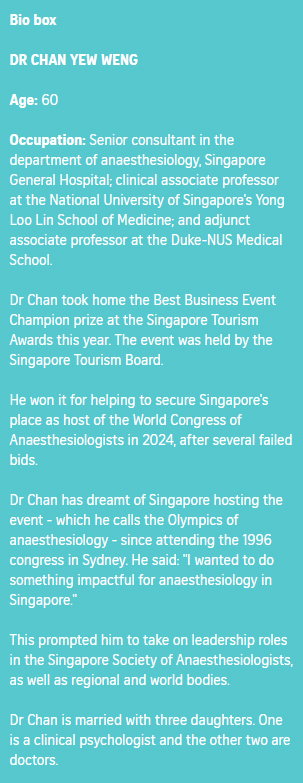Interview with anaesthesiologist Chan Yew Weng
By Annabeth Low, The Straits Times
Anaesthesiologists safeguard the bodily functions of patients during surgery
Q I SPECIALISE IN ANAESTHESIOLOGY BECAUSE...
A Anaesthesiology chose me. When I was in national service, my first medical officer posting was six months' clinical training in the anaesthesia department at Singapore General Hospital.
After that, the Health Ministry posted me to the now-defunct Toa Payoh Hospital for two years. The head of department applied for a training fellowship in anaesthesia for me, without informing me.
Q IF I WERE TO GIVE AN ANALOGY FOR WHAT I DO, I'D BE...
A A pilot. People say surgery is like being in a plane. We are the ones who make sure your bodily functions are kept as normal as possible.

Q ANY INTERESTING CASES?
A In 1994, I was given the responsibility of looking after VIPs.
After anaesthetising a VIP patient, I asked him: "How are you?"
He misheard and thought I had said, "how old are you?"
He gave me his age at the time, 70-something, then looked at me and said: "Why do you ask?"
I quickly answered: "Oh, because your blood pressure is very good."
He asked me: "How old are you?"
I said: "I'm 37. I'm head of this department, but I'm not very happy."
I had been unwilling to take up the stressful leadership position as I felt that I lacked management experience.
The VIP patient looked me square in the eyes and said: "What's the problem? I became prime minister of the country at the age of 35."
Q A TYPICAL DAY FOR ME WOULD BE...
A Quite routine and less stressful since I relinquished all my hospital management duties a decade ago.
I usually start the day at 7.15am with a clinical teaching session. By 8.15am, I would be reviewing the clinical notes of patients scheduled for surgery that day and preparing the first patient for anaesthesia.
I finish work around 6pm and I may review some of the patients in the wards or recovery rooms.
Q ONE LITTLE-KNOWN FACT ABOUT ANAESTHESIOLOGY IS...
A Without the progress and safety in anaesthesia care, many of the advanced surgical procedures involving robotic and minimally invasive techniques cannot be done.
Q PATIENTS WHO GET MY GOAT ARE...
A Those who do not adhere to fast- ing regimes or medication instructions on the morning of the surgery. People need to know that these are safety measures to minimise the risk of possible complications.
Q THINGS THAT PUT A SMILE ON MY FACE ARE...
A Patients who wake up pain-free in the operating theatre, thank the staff and wave goodbye.
Q IT BREAKS MY HEART WHEN...
A We have to break the bad news to patients or their family members when the surgical diagnoses or outcomes are not desirable.
Q MY BEST TIP IS...
A We are never too young to take on leadership roles.
Q I WOULDN'T TRADE PLACES FOR THE WORLD BECAUSE...
A I have a fulfilling professional life. In fact, I am organising the upcoming World Congress of Anaesthesiologists in Singapore.
SOURCE: THE STRAITS TIMES. SINGAPORE PRESS HOLDINGS LIMITED. REPRODUCED WITH PERMISSION.
